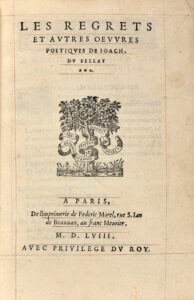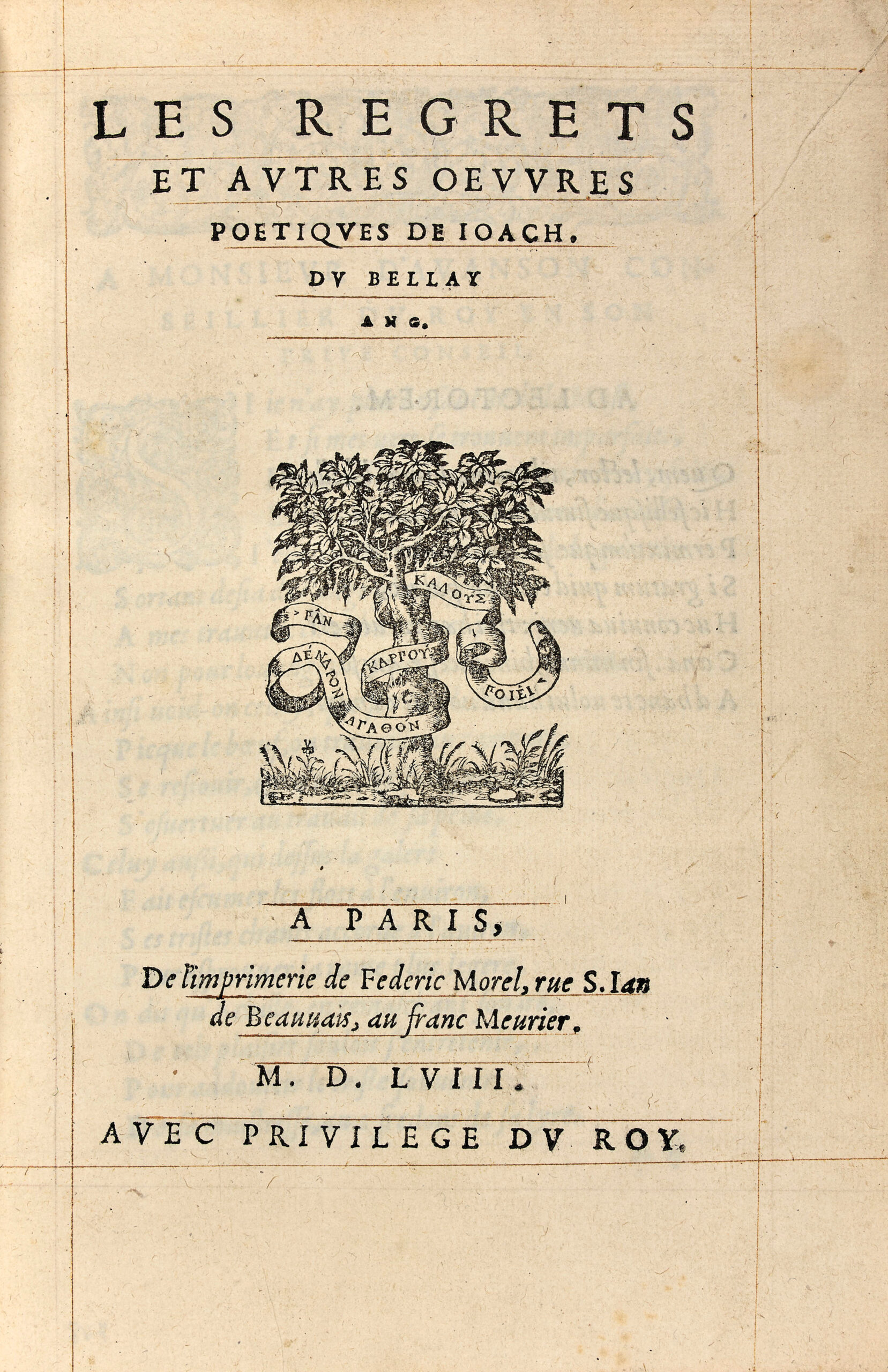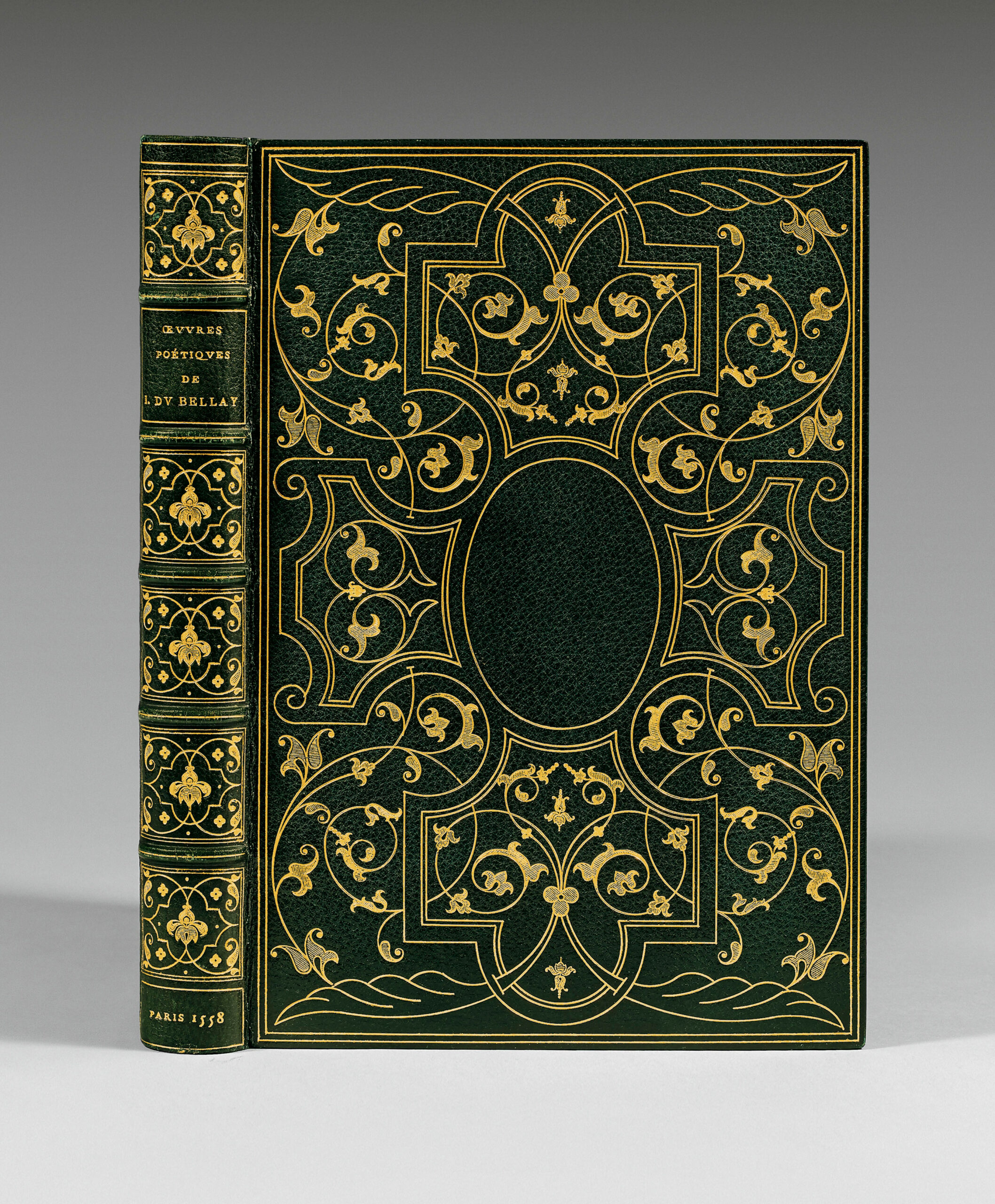– Les Regrets et autres Œuvres poétiques.
Paris, Federic Morel, 1558.
Small 4to of (4) ll., 46 ll. Ruled.
First edition.
– Le Premier Livre des Antiquitez de Rome, contenant une generale description de sa grandeur…
Paris, Federic Morel, 1558.
13 ll. and (1) l. of privilege.
First edition.
– Discours au Roy sur la Treve de l’an MDLV.
Paris, Federic Morel, 1559.
(6) ll.
First edition with a new title-page.
– Entreprise du Roy-Daulphin pour le tournoy, sous le nom des chevaliers advantureux. A la Royne, & aux Dames.
Paris, Federic Morel, 1559.
(14) ll.
First edition with new title-page.
– Tumulus Henrici Secundi Gallorum Regis Christianiss.
Paris, Federic Morel, 1559.
(14) ll.
First edition.
– Divers Jeux rustiques, et autres œuvres poetiques.
Paris, Federic Morel, 1559.
(76) ll. The Privilège is dated January 17, 1557.
First edition with a new title-page.
– Hymne au Roy sur la Prinse de Calais.
Paris, Federic Morel, 1559.
(6) ll.
First edition with a new title-page.
– Epithalame sur le mariage de tres illustre prince Philibert Emanuel, duc de Savoye, et tres illustre princesse Marguerite de France, sœur unique du Roy, et duchesse de Berry.
Paris, Federic Morel, 1559.
(14) ll.
First edition with a new title-page.
– Deux Livres de l’Enéide de Virgile, a scavoir le quatrieme, et sixieme, traduicts en vers françois par I. du Bellay Angevin.
Paris, Vincent Sertenas, 1560.
(73) ll., (1) l.
First edition with the extremely rare address of Vincent Sertenas.
– Louange de la France et du Roy tres chrestien Henry II. Ensemble un discours sur la poésie, Au Roy.
Paris, Vincent Sertenas, 1560.
(8) ll.
First edition with the extremely rare address of Vincent Sertenas.
– Elegie sur le trespas de feu Ioach. Du Bellay Ang. Par G. Aubert de Poictiers, Advocat en la Court de Parlement de Paris.
Paris, Federic Morel, 1560.
(6) ll., last blank.
Together eleven original editions bound in 1 volume 4to, ruled; full green morocco decorated with gilt fanfare by Hardy, one of the illustrious bookbinders of the Second Empire.
220 x 152 mm.
Formidable collection of first editions of landmark literary works such as Les Regrets or Le Premier Livre des Antiquitez de Rome as well as works by Du Bellay so rare that Tchemerzine has never seen them: Louange de la France or Deux Livres de l’Enéide by Vincent Sertenas.
As for the Epithalame of 1559, Pierre Beres wrote a long time ago that only 2 copies of this first edition were known.
Joachim du Bellay (1522-1560) belonged to the illustrious family that, in addition to several captains, diplomats and memorialists, produced the following in the 16th century: Guillaume du Bellay, sire de Langey, man of war, diplomat and historian; Cardinal Jên du Bellay born in 1492, died February 16, 1560, ambassador and humanist, one of the patrons of the Collège de France; and their brother Martin, lieutenant general of Normandy, died at Glatigny in 1559, all three uncles of Joachim. Around 1546, the young Joachim studied law in Poitiers. There, he made friends with the humanist Muret and with a number of Latin and French poets, such as Jên de La Péruse, Salmon Macrin and others. But the meeting with Jacques Peletier in 1546, and Ronsard in 1547, were more important in awakening his poetic vocation. With Ronsard, he went to Paris to study under Dorat, principal of the Collège de Coqueret. In this rather obscure college, he had the joy of discovering young gentlemen who, neglecting the Court where their birth would have allowed them to shine, devoted themselves passionately to the study of the Ancients and especially the Italians. Around Ronsard, they set themselves the task of preparing a poetic revolution.
His poetic work, like his life, is divided between two periods, separated by his stay in Rome from 1553 to 1557, from which he seems to have returned transformed. As G. Gadoffre points out, “the change of scenery, contact with a cosmopolitan society and an international administration, the tête-à-tête with History, with an Antiquity other than that of books, all contributed to questioning a certain number of acquired assurances and behaviors”. The young poet of 1549 called for the crêtion of a grêt national literature, and justified drêms of a translatio imperii in favor of the French monarchy with an eloquent and impassioned eulogy of France, as befits a peroration, culminating in the Deffence. The mature author of 1558-1559 had become aware of a broad Europên horizon, his political thinking, less approximate, was anchored in consideration of the “four estates of the Kingdom of France”, and he had found his voice – or rather his voices, for he cultivated more than one.
Despite his frail hêlth and the disappointments that seem to have often been his lot, Du Bellay was constantly energetic. In just ten yêrs, he wrote an abundant, diverse and constantly innovative work of poetry in French and Latin: he was the author of the first literary manifesto of French letters, the first collection of French love sonnets, the first collection of lyrical odes, the brilliant translator of Virgil; he decisively expanded the register of the sonnet in the Antiquités and in the Regrets, made himself one of Europe’s finest neo-Latin poets, and finally metamorphosed into a lêding political poet. He was not just the brilliant second of the Pléiade, in the shadow of Ronsard; he was one of the grêtest French poets, one of the most innovative.
Du Bellay was, the poet whom the 1549 Deffence et illustration « qui me fera indigner, apayser, ejouyr, douloir, aymer, hayr, admirer, etonner, bref, qui tiendra la bride de mes affections, me tournant ça & la à son plaisir”. An admirable prose writer, with a suppleness unrivalled in his time, and a poet of diverse styles in Latin and French, he nonetheless possessed a timbre recognizable among all, a liveliness of phrasing, a clarity of diction, which give his work an unmistakable unity. Although some of his poems, notably in Les Regrets, have consistently found rêders, not without misunderstanding at times, and although they are constantly included in anthologies and offered up for admiration by the school, Du Bellay remains, in the words of G. Gadoffre, “a partly unknown writer”.
Du Bellay is considered one of the finest ornaments of his century, a reputation he fully justifies. “While far from having the power of Ronsard, and, let us say, his richness and variety, Du Bellay appêrs more spontaneous in the expression of feelings. Through his sensitivity, Joachim du Bellay introduces a new source of inspiration to French poetry.”
Superb copy, ruled, pure and with wide margins, from the B. Delessert library. (1912, n°221) and Pierre Louys (1930, n°179).
See less information



